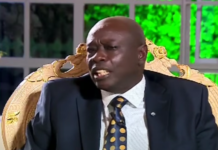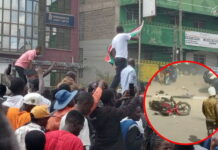It has been almost 6 months since the Catholic Church in Kenya stepped up to face the corruption monster. Thie move marked the first time that a local church launched a spiritual onslaught on graft.
So committed is the church to the war on graft that for a solid six months, all new members have been committing to fight the monster with spiritual rather than legal weapons.
All new members — and parents on behalf of infants — are said to have been renouncing corruption during baptism, the same way they have done for centuries by answering “I do” to the familiar question, “Do you renounce corruption?”.
It is evident from the 76-page campaign document obtainable online that corruption, which falls under leadership and accountability, is actually a cross-cutting issue that touches on all the themes.
During his October 2015 visit to Kenya, Pope Francis urged the youth, regarded as the future of any nation, not to succumb to the snares of corruption.
And in what might well be taken as the cue for the bishops-led campaign, the Pope said Kenyans would require individual and collective moral responsibility to fight the vice in order to achieve the desired zero tolerance to corruption. Corruption is just another form of tyranny,” he added.
The Catholic Church’s anti-corruption campaign is informed by the belief that legal means alone will not win the war on corruption, which they want scaled up to the spiritual level. How to deepen that awareness — that “corruption starts with me” — is the challenge the Catholic Church seeks to address in its 2020 Lenten campaign.
Bishop Rotich described this year’s Lenten campaign as a 40-day school of prayer and evangelization that ropes in all the hierarchies of the church — from the family, which is the first school of virtue.
The church is calling on its faithful to shun devious ways, and instead seek forgiveness for sins such as greed, which is a major driver of corruption, and practise almsgiving and visit prisons, hospitals and orphanages.
“The nation is suffering from this ill [corruption] and we’re inviting the leadership of the country to join us,” Bishop Rotich said of the spiritual thrust the Church has taken.
Will the spiritual cudgels the church is wielding against corruption work?
Inasmuch as the path the Catholic Church is taking may raise eyebrows in an increasingly secularizing country, the place of religion in human life is defined in Article 18 of the Universal Declaration of Human Rights. this right includes freedom to change his religion or belief, and freedom, either alone or in community with others and in public or private, to manifest his religion or belief in teaching, practice, worship, and observance.”
The tail end of the quote: “ … to manifest his religion or belief in teaching, practice, worship and observance” is pertinent and puts the church’s spiritual approach to fighting corruption in context.



















